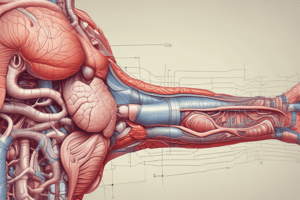Podcast
Questions and Answers
Which organ is primarily responsible for nutrient absorption?
Which organ is primarily responsible for nutrient absorption?
- Mouth
- Small Intestine (correct)
- Large Intestine
- Stomach
Chemical digestion occurs only in the stomach.
Chemical digestion occurs only in the stomach.
False (B)
What process involves the intake of food through the mouth?
What process involves the intake of food through the mouth?
Ingestion
The __________ stores waste until it is eliminated.
The __________ stores waste until it is eliminated.
Match the following digestive organs with their functions:
Match the following digestive organs with their functions:
Which enzyme in saliva is responsible for the chemical digestion of carbohydrates?
Which enzyme in saliva is responsible for the chemical digestion of carbohydrates?
The large intestine is responsible for nutrient absorption.
The large intestine is responsible for nutrient absorption.
What type of nutrient is broken down into amino acids?
What type of nutrient is broken down into amino acids?
The _________ controls fecal excretion through sphincters.
The _________ controls fecal excretion through sphincters.
What is the function of bile produced by the liver?
What is the function of bile produced by the liver?
Flashcards are hidden until you start studying
Study Notes
Overview of the Digestive System
- Function: Breaks down food into nutrients for the body to absorb and use.
- Major processes: Ingestion, digestion, absorption, and elimination.
Major Organs
-
Mouth
- Mechanical digestion through chewing.
- Saliva contains enzymes (amylase) for chemical digestion of carbohydrates.
-
Esophagus
- Transports food from the mouth to the stomach via peristalsis (muscle contractions).
-
Stomach
- Temporarily stores food, mixes it with gastric juices (acid and enzymes).
- Begins protein digestion (pepsin) and converts food into chyme.
-
Small Intestine
- Consists of three sections: duodenum, jejunum, ileum.
- Primary site for nutrient absorption.
- Pancreatic enzymes and bile aid in fat digestion.
-
Large Intestine (Colon)
- Absorbs water and electrolytes.
- Forms waste (feces) for elimination.
- Houses beneficial bacteria (gut microbiota) that aid digestion.
-
Rectum and Anus
- Rectum stores feces until elimination.
- Anus controls fecal excretion through sphincters.
Accessory Organs
- Salivary Glands: Produce saliva that contains enzymes for carbohydrate digestion.
- Liver: Produces bile, which emulsifies fats.
- Gallbladder: Stores bile until needed for digestion.
- Pancreas: Produces digestive enzymes (lipase, amylase, proteases) and bicarbonate to neutralize stomach acid.
Digestive Processes
- Ingestion: Intake of food through the mouth.
- Mechanical Digestion: Physical breakdown of food (chewing, churning in the stomach).
- Chemical Digestion: Enzymatic breakdown of complex molecules into simpler forms.
- Absorption: Nutrients absorbed through the intestinal walls into the bloodstream.
- Elimination: Disposal of indigestible substances as feces.
Nutrient Types
- Carbohydrates: Broken down into simple sugars (glucose).
- Proteins: Broken down into amino acids.
- Fats: Broken down into fatty acids and glycerol.
Regulation of Digestion
- Hormones (e.g., gastrin, secretin, cholecystokinin) regulate digestive processes and enzyme secretion.
- Nervous system influences digestive activity through the enteric nervous system.
Common Digestive Disorders
- Gastroesophageal Reflux Disease (GERD): Acid reflux causing heartburn.
- Irritable Bowel Syndrome (IBS): Affects the large intestine, causing cramping, diarrhea, and constipation.
- Celiac Disease: Immune response to gluten leads to intestinal damage.
- Peptic Ulcers: Sores in the stomach lining due to excess acid or H. pylori infection.
Importance of a Balanced Diet
- Provides essential nutrients required for the functioning of the digestive system.
- Supports overall health and prevents digestive disorders.
Digestive System Overview
- The digestive system is responsible for breaking down food into nutrients that the body can absorb and use.
- It involves four major processes: ingestion, digestion, absorption, and elimination.
Major Organs
- Mouth: Chewing begins mechanical digestion. Saliva contains amylase for the chemical digestion of carbohydrates.
- Esophagus: Uses peristalsis (muscle contractions) to move food from the mouth to the stomach.
- Stomach: Temporarily stores food, mixes it with gastric juices (acid and enzymes), and begins protein digestion with pepsin. Converts food into chyme.
- Small Intestine: Divided into three sections: duodenum, jejunum, and ileum. The primary site for nutrient absorption, where pancreatic enzymes and bile aid in fat digestion.
- Large Intestine (Colon): Absorbs water and electrolytes. Forms waste (feces) for elimination. Houses beneficial bacteria (gut microbiota) that aid digestion.
- Rectum and Anus: Rectum stores feces until elimination. The anus controls fecal excretion through sphincters.
Accessory Organs
- Salivary Glands: Produce saliva containing enzymes for carbohydrate digestion.
- Liver: Manufactures bile, which emulsifies fats.
- Gallbladder: Stores bile until needed for digestion.
- Pancreas: Produces digestive enzymes (lipase, amylase, proteases) and bicarbonate to neutralize stomach acid.
Digestive Processes
- Ingestion: Taking in food through the mouth.
- Mechanical Digestion: The physical breakdown of food, including chewing and churning in the stomach.
- Chemical Digestion: Enzymatic breakdown of complex molecules into simpler forms.
- Absorption: Nutrients are absorbed through the intestinal walls into the bloodstream.
- Elimination: Disposal of indigestible substances as feces.
Nutrient Types
- Carbohydrates: Broken down into simple sugars (glucose).
- Proteins: Broken down into amino acids.
- Fats: Broken down into fatty acids and glycerol.
Regulation of Digestion
- Hormones: Regulate digestive processes and enzyme secretion. Examples include gastrin, secretin, and cholecystokinin.
- Nervous System: Influences digestive activity through the enteric nervous system.
Common Digestive Disorders
- Gastroesophageal Reflux Disease (GERD): Acid reflux causing heartburn.
- Irritable Bowel Syndrome (IBS): Affects the large intestine, causing cramping, diarrhea, and constipation.
- Celiac Disease: Immune response to gluten leads to intestinal damage.
- Peptic Ulcers: Sores in the stomach lining due to excess acid or H.pylori infection.
Importance of a Balanced Diet
- Provides essential nutrients for the proper functioning of the digestive system.
- Supports overall health and helps prevent digestive disorders.
Studying That Suits You
Use AI to generate personalized quizzes and flashcards to suit your learning preferences.




